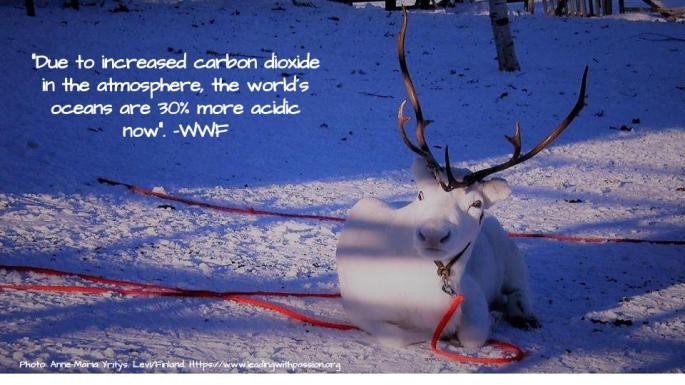
Ocean acidification is a serious threat to our planet and our marine ecosystems. The term ocean acidification signifies changes in the ocean´s natural pH balance, with pH in chemistry referring to the acidity and/or alkalinity of a solution on a logarithmic scale where seven (7) is neutral. The lower the pH of the solution, the higher the acidity and the higher the pH, the lower the acidity. pH is also a measure of the hydrogen ion concentration of a solution. (Academic Brooklyn).
Lower pH levels have also been measured in soils around the world, meaning that e.g. farming soils have in many places become more acidic due to a number of reasons, including poor soil management. pH can and is also measured in us human beings: some people even exercise alkaline diets with the thought that our bodies are healthier the more pH-balanced they are. Thus, eating and drinking habits that lead to our bodies becoming more acidic are thought as of being responsible for many health problems. A healthy human being has, on the average, a body pH of 7.4.
Since healthy and balanced pH levels are important for everything living on our planet, including ourselves, we can only guess what the consequences are when a normal pH becomes imbalanced: even small variations in a healthy pH can lead to significant changes in health, not only in us human beings but also in our soils and in our marine environments. Therefore, imbalances in our ocean´s pH levels and ocean acidification should be taken seriously.
The main cause of ocean acidification as per today is our oceans intake of carbon dioxide. All human activities on the planet release greenhouse gases into our atmosphere, with the amount of CO2 in our atmosphere being higher than ever before in human history. Up to 40% of all greenhouse gases in Earth´s atmosphere are being absorbed by our oceans, with e.g corals acting like trees in forests: corals in our oceans absorb toxins and pollution in the same way as our trees in our forests. Needless to say, this leads not only to a collapse in our coral ecosystems, but an immense amount of greenhouse gases in our marine environments that become more and more acidic. With the Arctic region warming, it releases a significant amount of both CO2 and methane (a significantly more powerful greenhouse gas than carbon dioxide), which leads to increased acidification all over our planet, destroying our world´s natural (pH) balance and making everything around us more acidic.
Learn more about ocean acidification by watching randomSFstuff´s video “Ocean Acidification Explained”:
Connect with me on Twitter @annemariayritys. For climate/environment-related posts only @GCCThinkActTank. Subscribe to Leading With Passion to receive my latest posts.
Take a step further to create YOUR online business. Learn more about the many benefits of how to create a beautiful website with WordPress.com and how to monetize your blog/website:
WordPress.com – Create A Beautiful Website
Jetpack – The ideal way to experience WordPress – Code-free Customization
WooCommerce – The most customizable eCommerce platform for building your online business


3 thoughts on “What Contributes to Ocean Acidification?”